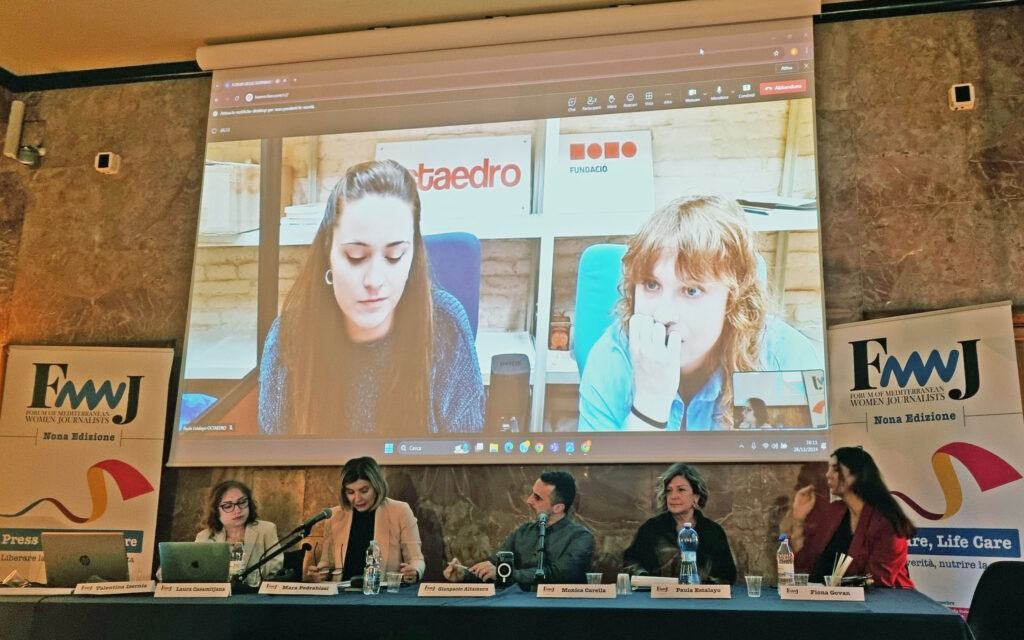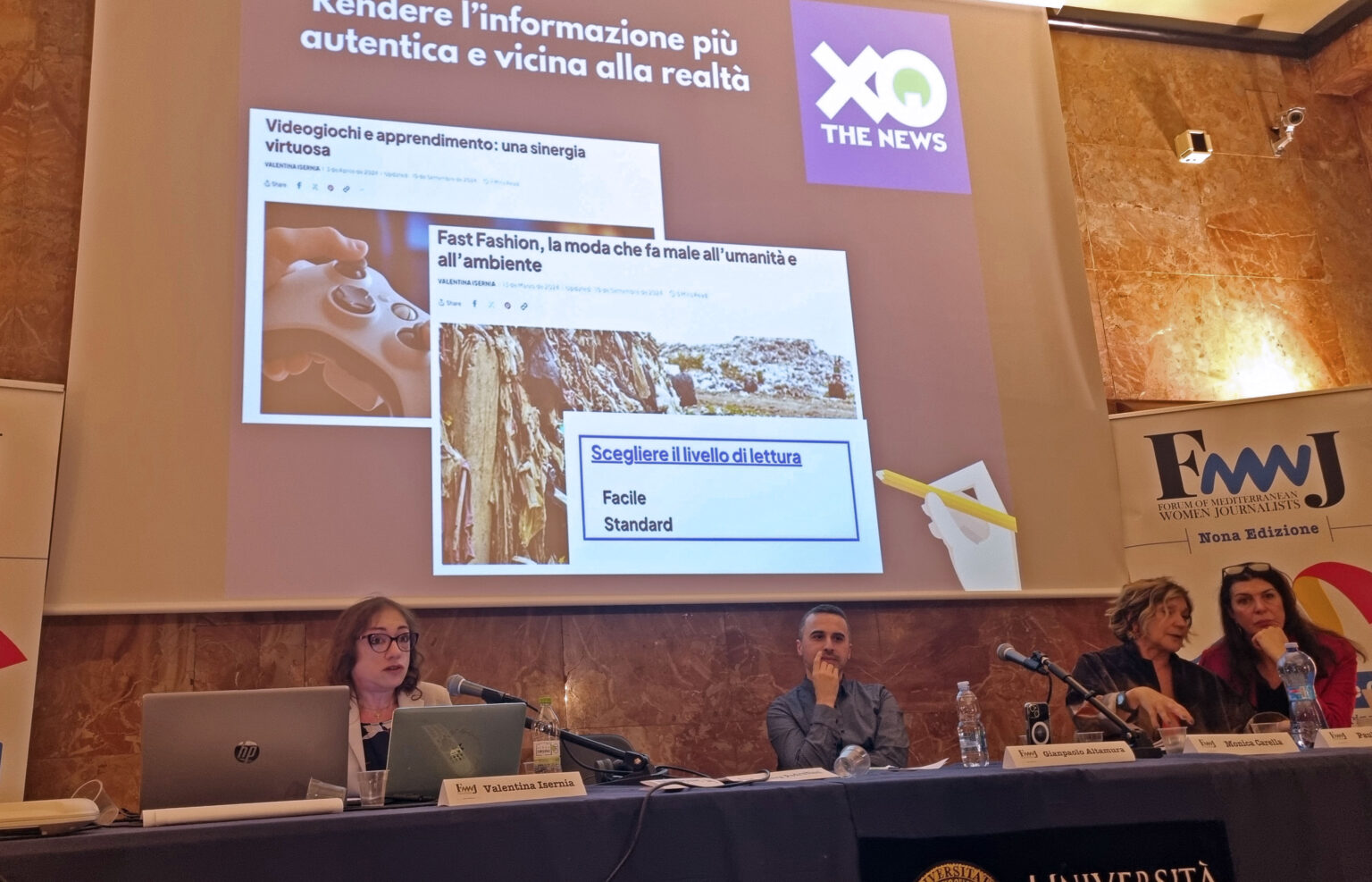The Forum of Mediterranean Women Journalists (FMWJ), a partner of ‘XQ the News’, calls for more space for new anti-patriarchal editorial models.
The 9th edition of the Forum of Mediterranean Women Journalists (FMWJ) was held in Bari on 25-26 November and in Lecce on 27 November. This edition, like the 2023 edition, was held in collaboration with the XQ.EUJOY consortium.
The event addressed the theme of the protection of press freedom understood as the defence of all aspects of democratic life, civil rights, human rights and environmental and ecological justice.
The level of press freedom is, in fact, a measure of the strength of the rule of law.
The level of press freedom is, in fact, a measure of the strength of the rule of law.
And while in Italy the growing instability of the editorial line and the transformation of young women journalists into precarious workers cannot guarantee the succession in a category that is increasingly thinning its ranks, at European level the ‘news deserts’ are growing, the news deserts, the areas where there are no newspapers that watch over democracy: to pay the piper are, as always, the minorities, and among them women, the favourite target of the haters.
The role of women in information
It is up to journalism to create an aware public opinion and to disrupt the rape culture, which also feeds on stereotypes and discrimination transmitted by the abusive language of the press when it fails to fulfil its ethical obligations. But how can the press create a virtuous circle if the figure of the journalist is increasingly weakened? Research shows that sexual harassment is more prevalent in journalism than in other fields and helps to keep women journalists in a subordinate position. In addition, discrimination, the gender pay gap and glass ceilings undermine their careers: newspapers are mostly written by women, but designed and edited by men. The patriarchal mentality is inevitably reflected in the treatment of news about women. But it is women, even in the newsrooms, who are responsible for “liberating truth and nourishing life”: it is mainly women who raise the question of gendered language, of the use of “good” words, i.e. those that do not multiply inequalities but respect the dignity of the subjects narrated, just as it is mainly women journalists who seek and implement new cooperative models of editing and new modes of management, circular rather than vertical, authoritarian rather than directive.
The goals of the 9th FMWJ
In the 2024 edition of the Forum we wanted to investigate the exact point of intersection between freedom of the press (duty and right), women’s freedom and self-determination, and the social reproduction action carried out by all women, including journalists who, within the newsrooms, propose and demand greater attention to language, the correct representation of gender, disability, ethnicity and all minorities, the attention to avoid the double standard according to which there are deaths and violence of series A and B, typical of the mainstream Western narrative; these are all issues that women in the newsrooms are dealing with.
What we are proposing today, in this 9th edition of the Forum of Mediterranean Women Journalists, is to look at ethical journalism, the one that wants to take care of words and with words, as a form of social reproduction, which women journalists are once again in charge of.
In fact, as Jineolojî, the ‘Science of Women’ behind the women’s revolution in Kurdistan, who led one of the most popular panels at the Forum (click here), teaches us, the category of social reproduction is much broader than we think, because it also implies the reproduction of the ecosystem, of other living beings, of the whole of society as we know it, that is, of ourselves in relation to others and to nature.
Of this connective tissue that allows societies to produce and reproduce (exist), the free and independent press is part of it, so that freeing the truth means nourishing life.
In this sense, the Forum of Mediterranean Women Journalists demands that now and immediately, at all levels, national and international, institutions should put in place forms of incentive and support for the creation of innovative and creative editorial systems based on anti-patriarchal models, which favour the self-determination of minority groups, especially young people and women.
For if the press fails to be fully free, if it fails to liberate the truth, it will also fail to ‘nourish life’; that is, it will fail to be a promoter of ‘values’ and ‘good’ words aimed at strengthening the social pact between citizens and the institutions that represent them; It will not succeed in bringing otherwise invisible discriminatory phenomena to light through ‘good’ data; it will not succeed in fulfilling its pedagogical function of education to critical thinking, because in education to critical thinking the foundations are laid for the control of power, control without which true democracy risks perishing.
In-depth report on XQ the News
One of the eight panels of the Forum was dedicated to journalism as a pedagogical tool for the exercise of critical thinking and the formation of global and digital citizenship.
The case of the magazine XQ the News was presented as an example of how to effectively engage ‘Generation Z’, experimenting with innovative ways of decolonising information in an intersectional way, creating new ecosystems for more empathetic and emotionally engaging learning and information.
At round table 6, entitled ‘Between edutainment and infotainment: journalism as a pedagogical tool’, the following took part: Paula Estalayo, project coordinator at Octaedro; Mara Pedrabissi, president of the Equal Opportunities Commission of the FNSI (Italian journalists’ union), Fiona Govan, freelance journalist (Spain), Laura Casamitjana, journalist and content editor at XQ The News, Valentina Isernia, journalist at the cooperative IdeaDinamica. The debates were moderated by Gianpaolo Altamura, journalist and researcher in Contemporary Italian Literature at the University of Bari.



